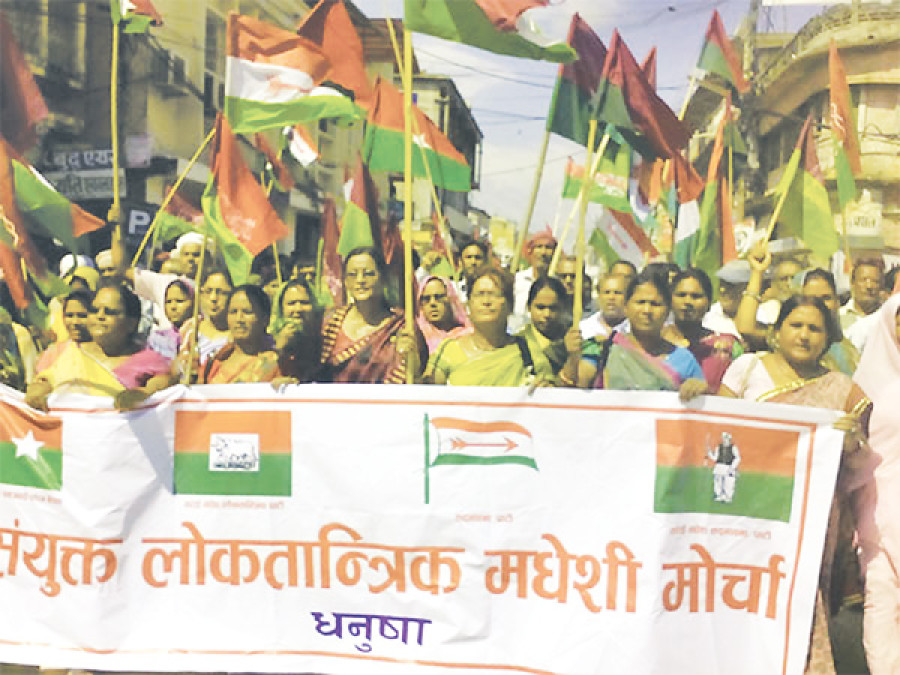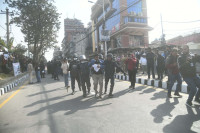Opinion
Mood of the Madhes
If the state continues to ignore the grievances of the Madhesi people, it will do so at its own peril
Randhir Chaudhary
When the Interim Constitution was promulgated on January 15, 2007 and the term ‘federalism’ was not included, it compelled the Madhesi people and other marginalised communities to fight for their rights. Consequently, they participated in street protests arguing for a federal state—one that provided them ethnic, economic and political autonomy. Taking these concerns into account, Madhesi activist Upendra Yadav had opposed the Interim Constitution by torching it in Maitighar Mandala. Then, the force used by Maoists in Lahan became the root catalyst of the Madhes Movement. The sacrifice of more than four dozen Madhesi youths compelled then Prime Minister Girija Prasad Koirala to address the issues raised by the movements in the Constituent Assembly (CA). The PM promised the agitators that Nepal would be federated.
Demarcation and consultation
In order to end the political deadlock that has lasted for decades, the so-called four major parties recently forged a 16-point agreement, deferring some of the contentious issues to be addressed later. They released a draft constitution without the demarcation and the nomenclature of the provinces, and the government of Nepal declared July 20 and 21 as public holidays to collect feedback from the public on the draft constitution. But the Madhesi parties and cadres were opposed to the status quo during these meetings. During the feedback programmes, veteran leaders from the so-called big parties also faced hurdles from the people of the same constituencies where they won elections. So the question that arises is: Why did leaders face opposition in their constituencies? Why did the consultation programmes in Janakpur not succeed? The protests referred to the often cited Article 13 (3) of the draft constitution which states that the offspring of a Nepali national and a foreigner will receive a naturalised citizenship. This kind of citizenship is mainly conferred on foreigners and will not allow the citizen to hold any constitutional posts like president, prime minister, chief minister, and so forth. Hence this provision will victimise the Madhesi community, members of which often have marital relationships with nearby Indian nationals. Madhesis have repeatedly asked the state that the constitution be promulgated from the CA itself by ensuring the autonomous federal units with their names and boundary issues addressed as stated in Article 138 (1 a) of the Interim Constitution.
Prashant Jha has rightly depicted in his book, Battle of the New Republic: “A political idea, once planted in the popular consciousness, doesn’t die easily.” The idea of citizenship and federalism is deeply rooted in the minds of the Madhesi people. Sushil Karna—one of the core members of Madhesi Adhikar Sangharsh Samiti—who was hospitalised for two days after getting beaten up by police forces in Janakpur during the feedback programme said, “Madhesis are seeking a prosperous Nepal and this is only possible if all the excluded groups—Madhesis included—feel like they are part of the nation. Federalism is the one righteous instrument that will fulfil the ideals of an egalitarian Nepal. We would never accept a constitution without federalism; we are ready to face the excessive use of force in inevitable andolans.”
New discourse and solution
The newest change in the Madhesi movement is the initiation of Madhesi youths in politics. Most of the youth have started opposing their own leaders, let alone the constitution. The apolitical youth of Madhes feel like they have always been cheated, not only by the state, but by their own leaders. On one hand, leaders like Mahanta Thakur, Upendra Yadav, Rajendra Mahato and Anil Jha are getting defamed in their own constituencies and on the other hand a hardliner figure is emerging in the Tarai. A political wave among the youths in the age group 15-20 can be observed. If this wave radicalises the young, the state could see this unrest evolve into something it might not be able to control. Hence the state cannot be myopic. These issues must be addressed when in their primary stages and the state must respect the grievances of the Madhesi people. As the Madhesi people are only demanding the implementation of agreements carried out between the Madhes and the state in the past—such as the eight-point agreement between the Government of Nepal and United Democratic Madhesi Front, the 22-point agreement between the Government of Nepal and Madhesi Janadhikar Forum on February 28, 2008 and August 30, 2007 respectively—the government should not have any problem in addressing their demands.
Chaudhary is human rights officer at Terai Human Rights Defenders Alliance




 10.12°C Kathmandu
10.12°C Kathmandu










